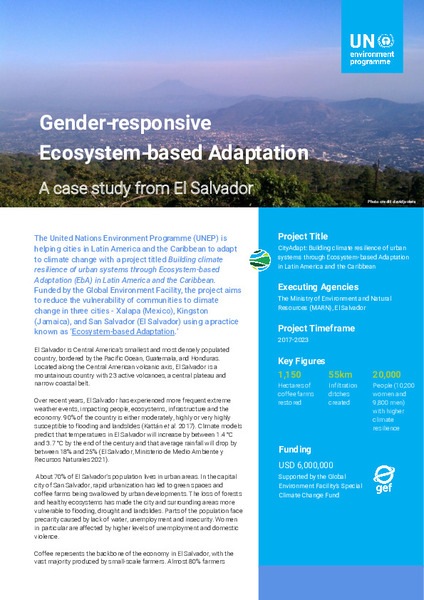Gender-responsive Ecosystem-based Adaptation: A case study from El Salvador

Date
2024-04Author
United Nations Environment Programme
Citation Tool
Bibliographic Managers
RT Generic T1 Gender-responsive Ecosystem-based Adaptation: A case study from El Salvador A1 United Nations Environment Programme YR 2024-04 LK https://wedocs.unep.org/20.500.11822/45305 PB United Nations Environment Programme AB TY - GEN T1 - Gender-responsive Ecosystem-based Adaptation: A case study from El Salvador AU - United Nations Environment Programme Y1 - 2024-04 UR - https://wedocs.unep.org/20.500.11822/45305 PB - United Nations Environment Programme AB - @misc{20.500.11822_45305 author = {United Nations Environment Programme}, title = {Gender-responsive Ecosystem-based Adaptation: A case study from El Salvador}, year = {2024-04}, abstract = {}, url = {https://wedocs.unep.org/20.500.11822/45305} } @misc{20.500.11822_45305 author = {United Nations Environment Programme}, title = {Gender-responsive Ecosystem-based Adaptation: A case study from El Salvador}, year = {2024-04}, abstract = {}, url = {https://wedocs.unep.org/20.500.11822/45305} } TY - GEN T1 - Gender-responsive Ecosystem-based Adaptation: A case study from El Salvador AU - United Nations Environment Programme UR - https://wedocs.unep.org/20.500.11822/45305 PB - United Nations Environment Programme AB -Item Statistics
Display item statisticsMetadata
Show full item recordDescription
Coffee represents the backbone of the economy in El Salvador, with the vast majority produced by small-scale farmers. Almost 80% farmers cultivate on small plots of less than 3.5 hectares. However, changing temperatures make growing coffee more difficult, while dependence on coffee alone leaves producers vulnerable to fluctuating prices on the global market. Increasing temperatures across coffee-growing regions in El Salvador have led to a loss of both the quantity and quality of coffee (Bravo-Ureta et al. 2022). Women represent about a third of all coffee producers in El Salvador. Women coffee producers have less access to land, resources and credit than men, limiting their capacity to earn a living and leaving them more vulnerable to the impacts of climate change. On the other hand, women have a unique relationship with nature, possessing local ecological knowledge and skills critical for climate change adaptation.
Collections
Document Viewer
To read more, scroll down below.

